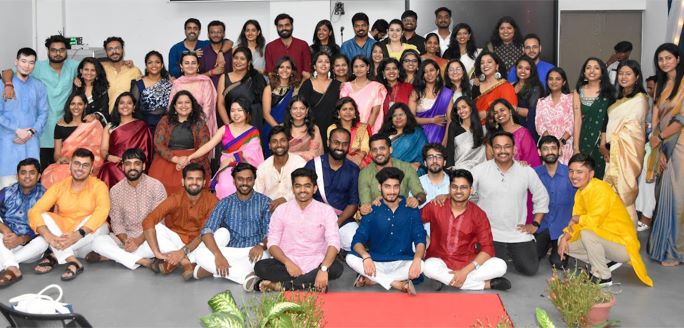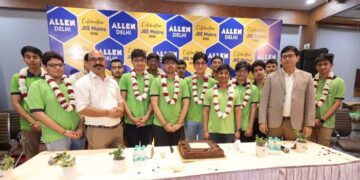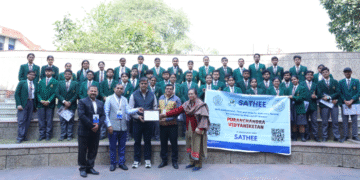With 46.9% of India’s population under the age of 25, the country has a tremendous opportunity to harness the potential of its youth. This demographic is a key driver of India’s GDP and overall growth but the fast-evolving job market demands constant upskilling. Furthermore, emerging technologies like generative AI, robotics, and cloud computing necessitate advanced skills. By 2025, AI is expected to contribute up to $500 billion to India’s GDP, potentially reaching $967 billion by 2035.
At the same time, India’s youth has also a key role in contributing to sustainable and inclusive development to foster a meaningful societal impact. Notably, India’s social development sector has undergone significant transformation over the years. With the growing need to balance economic progress with social development, the sector is garnering attention from corporates, investors, academia, and governments. This is evident from an industry report stating that over the last five years, India’s social sector spending has experienced robust annual growth of 13% and stands at approximately Rs 23 trillion ($280 billion) in FY 2023 (8.3% of GDP), creating significant opportunities in the sector.
Areas such as impact investment funds, ESG (Environmental, Social, and Governance) and SDG (Sustainable Development Goals) focused companies, and various government bodies are unlocking new possibilities. Highlighting the emerging career opportunities in this field, experts share that in terms of domain, there are policy-based roles, gender or education-focused positions, and opportunities in social startups. There has been a greater emphasis on climate change and action, further expanding career prospects.
“These days, there are immense opportunities for young people who want to enter the social sector beyond working for NGOs. The social sector allows youngsters to understand grassroots-level problems and come up with meaningful solutions. An upcoming and interesting space includes roles in impact investment funds, ESG and SDG-focused companies, and various government bodies. In terms of domains, there are policy-based roles, gender or education-focused positions, and recently, more emphasis has been placed on climate change and action. This sector also provides tremendous cross-country learning opportunities. Working in the social sector can be extremely rewarding if you are passionate about it, and you can climb up the career ladder to become a domain expert,” says Dr Kalpana Sankar, Chairperson and Managing Trustee, Hand in Hand India.
Elaborating on this, Dr. Arulsamy, Faculty – Sustainable Livelihoods and Cross-Cultural Management, Great Lakes Institute of Management, Chennai, adds,” Today’s social development landscape offers myriad career paths beyond traditional NGO roles. The rise of impact investment funds, ESG-focused companies, and government initiatives demonstrates that there are abundant opportunities for young professionals committed to driving meaningful change. The emerging opportunities in the social sector can include poverty alleviation, addressing climate change, reducing educational inequality, promoting human rights, and more. There is a growing trend of individuals and organizations establishing social enterprises focused on renewable energy, waste management, and sustainable agriculture, among other areas.”
Prof. Gopal V Wamane, Program Director, Dept of Economics and Public Policy, School of Economics and Commerce, MIT World Peace University, Pune says, “The social sector is witnessing a surge in career opportunities driven by an increasing focus on sustainable development, social equity, and community well-being. Emerging roles include Social Impact Analysts, Community Development Managers, Sustainability Consultants, and Public Policy Advocates. According to research, India’s social sector is massive, with 3.3 million non-profit institutions (NPIs) providing jobs for over 18.22 million people. With the rise of Corporate Social Responsibility (CSR) and Environmental, Social, and Governance (ESG) frameworks, professionals are also in demand in areas such as CSR strategy, ESG reporting, and social entrepreneurship.”
Are there any courses offered?
Gauging the growth trends in the social development sector and preparing aspiring individuals to build promising careers, educational institutions are expanding their offerings with various undergraduate and postgraduate degree and diploma courses. Courses on environmental management, sustainable management, public policy, and public administration are being offered by multiple colleges and universities, including elite institutions such as IIMs, IITs, and other reputed B-schools.
“While courses in environmental management and sustainability management focus on the implementation aspect, public policy and public administration courses provide a more broad-based, policy-focused approach to sustainability. Additionally, there is an ever-expanding pool of paid and a few free certification courses being offered by universities, institutions, and EdTech companies, pertaining to ESG and BRSR reporting and compliance, which help add to the skill mix of career aspirants in this sector,” informs Dr. Sanghamitra Bhattacharyya, Director of the Centre of Excellence for Sustainable Development and Professor of Organizational Behavior at Great Lakes Institute of Management, Gurgaon.
How to start and the opportunities
To aspiring individuals looking to make a career in the social sector, Dr. Sankar advises that internships would be a good start to assess if you have the aptitude and attitude to work in the sector. It will also help you understand if you want to do a core grassroots job, work in the CSR space, or take the multilateral route.
Elaborating on the opportunities in the corporate sector and government initiatives, Dr. Bhattacharya adds, “A troll of popular job search sites and job postings on platforms such as LinkedIn and DevNet Jobs bear testimony to the uptick in internship opportunities that are on offer regularly, including from some of the top names in the corporate sector. Additionally, for students keen to work on urban sustainability issues, the Government of India has introduced the TULIP (The Urban Learning Internship Programme) – a joint initiative by AICTE and the Ministry of Housing & Urban Affairs, where students and fresh graduates can work directly with city administrators and Urban Local Bodies on various developmental projects. This experiential learning helps hone students’ problem-solving and critical thinking skills, as well as skills in field-based research work, making them attractive hires for corporates looking to recruit a skilled workforce for their sustainability domains.”
Professor Wamane also informs that universities are establishing partnerships with NGOs and corporations, providing a bridge to internships and job placements. Students should take full advantage of these partnerships, which often come with the added benefit of academic credits or stipends. To further enhance employability, students should consider pursuing certifications in CSR, sustainability, or social impact from reputable institutions. These certifications provide a deep understanding of the principles and practices of CSR and ESG, equipping students with the skills needed to excel in these roles.
Quotes on Youth Day from Educationists:
“Our youth must be aware that we are on a ticking time bomb, and their actions will determine the future of our planet. Integrating the United Nations’ 17 Sustainable Development Goals (SDGs) into the curriculum is essential for building this awareness and equipping students with the knowledge and skills needed to address these challenges.
Understanding the SDGs helps students recognize the interconnectedness of social, economic, and environmental issues, fostering a holistic approach to problem-solving. This involves creating a green campus and ensuring that students develop an empathetic mindset for global concerns towards the environment at large, by coming together in the format of environmental clubs which allow them to put their thoughts into action. By cultivating a consciousness toward the environment, students develop a deep connection and respect for nature. This bond ensures that they leverage technology to promote sustainable development and find innovative ways to achieve these goals. Including SDGs in the curriculum is not just necessary; it is imperative for shaping future leaders who are equipped to build a sustainable and equitable world.” –Sanamdeep Chadha, Promoter and Director of Genesis Global School, Noida
“Empowering the youth is not just about granting them the tools and resources; it is about engaging them as active participants in decision-making processes that affect their lives and communities. By fostering educational opportunities that promote critical thinking, creativity, and entrepreneurship, we can equip young individuals with the skills necessary to thrive in a rapidly changing world. Creating safe spaces for dialogue and collaboration enables young individuals to voice their ideas and aspirations, making them key stakeholders in the journey toward a more sustainable world. It is paramount to advocate for policy changes that prioritise youth development, ensuring that the aspirations of the next generation are met with right support and opportunity.” – Dr. Maithili Tambe, CEO, The Academy School (TAS), Pune












